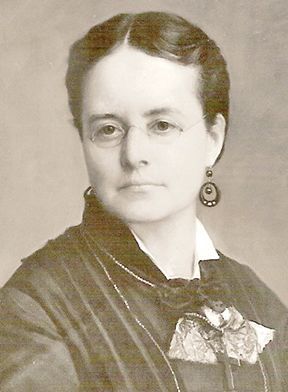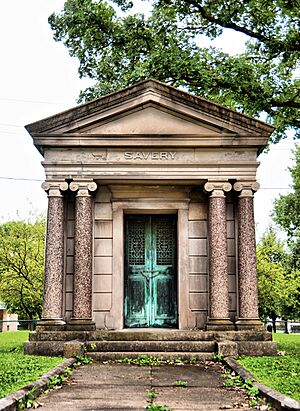Annie Nowlin Savery facts for kids
Quick facts for kids
Annie Nowlin Savery
|
|
|---|---|
 |
|
| Born | 1831 London, England
|
| Died | April 14, 1891 (aged 59–60) New York City, U.S.A.
|
| Education | University of Iowa |
| Occupation | Suffragist, philanthropist |
| Spouse(s) | James C. Savery |
Annie Nowlin Savery (born Annie Nowlin, 1831 – April 14, 1891) was an important American activist and generous helper of communities. She lived in Des Moines, Iowa. Annie is known as a pioneer for women's rights and for her work to get women the right to vote. This movement was called "woman suffrage."
She started working for women's voting rights in the 1860s. Annie became a leader in her county and state. She gave many speeches and helped create groups to support women's suffrage.
After a law to give women the right to vote was defeated in 1872, Annie Savery focused on other ways to help her community. She gave money to the public library in Des Moines. She also helped start the city's first public hospital. In 1875, Annie and another woman became the first two women to graduate from the University of Iowa College of Law. There, she studied the rights of married women. She passed the bar exam, which meant she could work as a lawyer in the highest courts. In 1997, after her death, Annie Savery was honored by being added to the Iowa Women's Hall of Fame.
Early Life and Moving to Iowa
Annie Nowlin was born in London, England, in 1831. When she was a baby, her family moved to the United States and settled in New York. As a young woman, she married James C. Savery on January 20, 1852, in Saratoga Springs, New York. James was a businessman who bought and sold land.
In April 1864, Annie and James moved to Des Moines, Iowa. At that time, Des Moines was a small town with about 1,500 people. They bought an old log house and turned it into a hotel, which Annie managed for a while. They also built a large house on Grand Avenue, where they often hosted many guests.
Meanwhile, her husband, James, built a new, modern hotel with his business partners. This hotel opened in 1862 and was called the Savery Hotel. James invested the money they earned from the hotel. By 1870, their land was worth much more as Des Moines grew. The city became an important stop for pioneers traveling west. The couple sold the Savery Hotel in 1878.
James Savery also helped start the American Emigration Company. This company helped nearly 100,000 immigrants from Scandinavia settle in Iowa and nearby states. Later, he invested in banks and land in the western United States, as well as in mining in Montana.
Annie Savery did not have much formal schooling when she was young. However, she loved to read and learn about many different subjects. She was known as a very smart person in Des Moines and supported cultural activities. Some say she hired a teacher to learn French, while others say she taught herself. In the 1870s, she went to law school at the University of Iowa and graduated in 1875.
Working for Change
Annie Savery is best known for being a pioneer for women's rights. She was very active in the woman suffrage movement in Iowa, starting in the 1860s. Her first speech about women's right to vote was in January 1868 in Des Moines. In 1870, she helped create the first woman suffrage group in Polk County, Iowa.
During the 1870s, Annie was part of the main committee for the National Woman Suffrage Association. She worked closely with famous leaders like Lucy Stone, Elizabeth Cady Stanton, and Susan B. Anthony.
In 1870, a bill to change the state constitution to allow women to vote was approved by a committee in Iowa. If this bill passed a second time in another session, people would get to vote on it. The bill was discussed by the state lawmakers in 1872, but it did not pass a second time. After this, many activists in Iowa became discouraged. No woman suffrage bill was suggested in Iowa again until 1916. This was just a few years before a national law was passed in 1919, finally giving women across the country the right to vote.
After the suffrage bill failed, Annie Savery turned her attention to other projects. In 1871, she became a business partner in a beekeeping operation. She also gave money to the Des Moines Public Library. She started a scholarship program to help women attend Iowa College, which is now called Grinnell College. Annie also worked to improve conditions at the county jail.
In 1874, the Saverys' home burned down. They then moved into a hotel suite. Annie had enrolled in the University of Iowa College of Law. She was one of only two women in her class and graduated with high honors in 1875. They were the first two women to graduate from law school in Iowa. Annie passed the bar exam, becoming one of the first women allowed to work as a lawyer in the Supreme Courts. She did not plan to work as a lawyer full-time. Instead, she wanted to learn more about the rights of married women. She also wanted to show other women that professional jobs were open to them.
In 1876, Annie Savery helped raise money to build the first public hospital in Des Moines. She was one of many women in the 1800s who were very important in creating and supporting libraries and hospitals in their communities.
Later Life and Legacy
After their house burned down and they faced money problems in the 1870s, the Saverys moved to Montana in 1878. There, James Savery made his money back through mining and other investments. In 1883, they moved to New York, where Annie was treated for a long-term heart problem. They still kept in touch with Des Moines. Annie traveled a lot in Europe in her later years, continuing her studies. As her health declined in the 1880s, Annie Savery became very interested in Theosophy, which is a spiritual belief system.
She passed away on April 14, 1891, in New York City. Her body was brought back to Des Moines for the funeral. Her friend, Judge Nathaniel M. Hubbard, gave the main speech at the funeral. He praised her intelligence and her desire to learn. Annie was buried in Des Moines in the Savery Mausoleum, a special tomb her husband built at Woodland Cemetery. Her husband, James, died on August 27, 1905, and was also buried in the family mausoleum.
In 1997, Annie Savery was honored for her contributions. She was added to the Iowa Women's Hall of Fame.
 | Precious Adams |
 | Lauren Anderson |
 | Janet Collins |


